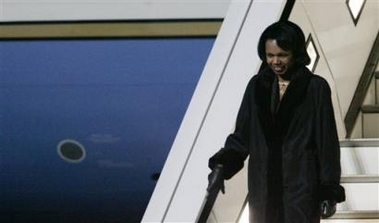|
Rice: US terror policy tough, but legal
(AP)
Updated: 2005-12-06 09:41 In Berlin, a government spokesman said Monday that Germany would ask Rice
about its list of more than 400 flights and landings in Germany by planes
suspected of being used by the CIA.
The European Union's justice commissioner says covert prisons and detainee
mistreatment would violate European human rights law, and he warned last week
that any host countries could lose voting rights in the powerful 25-nation bloc.
A November report in The Washington Post said that the CIA ran a network of
hidden prisons, including some in Eastern European democracies. The story and
its aftermath have rekindled opposition to President Bush and his foreign policy
in Europe and have threatened to fray diplomatic ties that Rice has tried to
forge this year.
The advocacy group Human Rights Watch followed the news report with claims
that it has tracked suspicious CIA flights around Europe since the 2001 invasion
of Afghanistan. The group pointed to sites in Poland and Romania as probable
hosts for secret prisons, but both those nations have denied it.

U.S. Secretary of State Condoleezza Rice
arrives at the military part of the Berlin Tegel airport, Monday, Dec. 5,
2005.[AP] | Rice's trip was planned before the
controversy broke, and her words Monday were an attempt to keep the issue from
completely overshadowing her other business. She put the onus to articulate
terrorism policies partly on the shoulders of European allies who also are
threatened by al-Qaida.
At the same time, she made the point that aggressive work to counter
potential terrorists can be uncomfortable for democracies.
"The captured terrorists of the 21st century do not fit easily into
traditional systems of criminal or military justice," she said. "We need to
adapt."
Information gathered by U.S. intelligence agencies from a "very small number
of extremely dangerous detainees" has helped prevent terrorist attacks in
several countries, Rice said.
"The United States has fully respected the sovereignty of other countries
that have cooperated in these matters," she said. "The United States is a
country of laws."
Rice's itinerary Tuesday includes a stop in Romania where, by chance, she is
to sign a defense agreement related to the military base identified by Human
Rights Watch.
Bush has said the United States does not allow torture, but the
administration has permitted harsh interrogation techniques at the Guantanamo
Bay military prison camp and elsewhere that human rights organizations say
violate the U.N. treaty. One widely cited method is "waterboarding," in which
prisoners are strapped to a plank and dunked repeatedly.
The 1994 treaty obligates nations to try to prevent cruelty that does not
meet the legal definition of torture. Vice President Dick Cheney has led a
lobbying effort against an attempt by Sen. John McCain to expressly forbid such
practices under U.S. law.
Human rights organizations and legal groups, both in the U.S. and abroad,
have also accused the United States of allowing a practice known as "rendition
to torture," in which suspects are taken to countries such as Egypt and Saudi
Arabia where harsh interrogation methods are used.
Rice denied it.
"The United States does not use the air space or airport of any country for
the purpose of transporting a detainee when we believe he or she will be
tortured," she said.
That declaration was welcomed by British Foreign Secretary Jack Straw. He
said, "All of us must work together �� within the rule of law �� to use every tool
at out disposal to deal with the threat of terrorism."
|